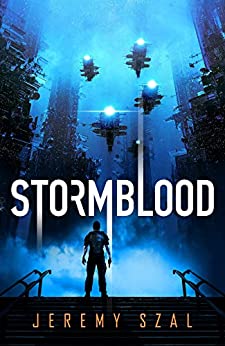After the fumbling, fraught and frustrating exercise of launching my own book, I really wanted to immerse myself in someone else’s work.
To find something to read, I did what I often do and turned to the Guardian Newspaper’s ‘Best Recent Science Fiction’ column. Flicking through the various months, I came upon Stormblood by Jeremy Szal.
I didn’t want anything too cerebral, and I wanted something with a bit of pace. I got what I asked for, but perhaps misjudged slightly what I actually wanted.
The word Stormblood refers to the method by which soliders during a cataclysmic war were enhanced. Injected with alien DNA, they were given unique abilities; faster healing, enhanced strength, increased aggression and the absence of fear. Drawn to risk, high on adrenaline, these ultimate soldiers are perfect because they can’t help but run towards danger.
It came at a cost. Now the war is over, the Reapers, as these soldiers are known, are easily identifiable; blue alien material coils under their skin. Moreover, the stormblood itself has become a drug, taken by addicts seeking the best of all highs. Unfortunately, once taken, that bell cannot be un-rung.
In the midst of this, a Reaper who has his addiction under control comes to the capital city of the Common, and becomes embroiled in an investigation into a drug-smuggling ring because his brother seems to be one of the smugglers.
It took me a while to warm to the central premise of Stormblood. The descriptions of the parasitic drug are repetitive and the author seems to run out of metaphors early. The story is also an escalating repetitive sequence: The protagonist investigates, gets captured, escapes, triumphs… repeat.
It takes about half the book before the originality of the premise really sinks in. As with most good ideas, it’s not the idea that matters but what the author does with it, and Szal takes half a (very long) book to get to the punch. Suddenly, what appeared to be a one-man rampage takes on the dimensions of a space opera, and the scope is abruptly, brutally enlarged.
Unfortunately, Szal doesn’t exploit this promising thread in the book, prefering to build it up as a secondary storyline, and leaving it hanging at the end. No doubt he’s keeping his powder dry for the sequel.
The action is intense, but almost omnipresent. I occasionally accelerated past fight scenes because I’d lost interest. Combat can span many pages, and what usually matters is the outcome. After the third or fourth multi-page fight sequence, I realized I’d lost interest in them. The overarching plot was more interesting and I wanted that to be the focus.
This is a personal preference issue. I don’t particularly enjoy first-person shooter style stories, and this is very much in that vein. Stormblood has been described as a mash-up of Altered Carbon and Mass Effect. If I’d read that before buying the book, I’d have realized that the Mass Effect half of that description doesn’t suit me.
That said, the world Szal has drawn has a ton of potential. His aliens are – while not very clearly drawn – very interesting in their diverse motivations and intentions. The technology is born of an overactive imagination. The multiple layered threats are a rich seam for him to draw from in sequels.
The book will certainly entertain you, although it could have been significantly shorter and would have been better for it. Stormblood is a very original premise, and if you’re looking for an action movie in book form, this will certainly fit the bill.
You can find Stormblood on Amazon and additional information on Goodreads.


